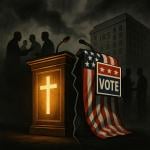ELIZABETH ASKS:
Liberals in the U.S. frequently point out that clergy will not be forced to perform same-sex marriages against their beliefs. However, are there other religious freedom issues at stake with the new Supreme Court ruling?
THE GUY RESPONDS:
The answer is yes, lots of them, according to religious groups that oppose same-sex marriage but also certain legal experts who advocate same-sex marriage and yet worry about threats to religious freedom.
The Supreme Court’s decision to abolish the federal Defense of Marriage Act raises the prospect that same-sex marriage will eventually be legalized nationwide. That could set up decades of conflict and throw traditionalists on the defensive — culturally, politically, legally — as they already are in some situations. Analysts agree that, yes, the Constitution means clergy cannot be forced to conduct same-sex weddings, and churches should enjoy freedom to preach, though “hate speech” codes could possibly come into play. Loss of tax exemption would be ruinous and some think that could eventually hit at least “parachurch” agencies, due to Supreme Court language in a 1983 Bob Jones University case.
That leaves numerous shorter-term problems. A major declaration from the U.S. Catholic bishops last year warned that “religious liberty is under attack.” The headlines go to Catholic (and Protestant) resistance to the government’s health-care mandate to cover contraception, sterilization, and alleged abortifacients. But the bishops also cited two gay-related issues: 1) Colleges barring student organizations that require leaders to uphold traditional sexual morality. 2) Catholic adoption and foster care agencies in three states forced to disband rather than place children with same-sex and cohabiting couples.
Catholic leaders also joined an interfaith appeal last year alongside key evangelical, Mormon, and Orthodox Jewish officials. This group said hundreds of laws and regulations could impact groups and individuals, not just regarding adoption or campus clubs but job discrimination, employee benefits, religious schools and camps, healthcare and eldercare, private landlords and wedding suppliers, professional accreditation for counselors, civil liability, tax policy, and the like. The interfaith group said “this is not idle speculation, as these sorts of situations have already come to pass.”
That warning received strong support in the American Jewish Committee’s “friend of the court” brief filed with the Supreme Court. It was written by AJC General Counsel Marc Stern, a top advocate of strict church-state separation for decades, and law Professors Douglas Laycock of the University of Virginia and Thomas Berg of the University of St. Thomas.
]The AJC said same-sex marriage should be legal, despite religious objections, but was equally concerned about “numerous religious liberty” issues on which it believes courts must protect conscientious objectors. The brief said U.S. religions could “face lawsuits, civil penalties, and loss of governmental benefits.” To the AJC, only a “compelling” government interest should interfere with religious conscience, for instance when a religious agency has a “local monopoly” and gay and lesbian couples cannot “readily obtain comparable services” elsewhere. The AJC observed that courts have been much less likely to protect conscience than legislatures, where traditionalists have some leverage.
Professor Laycock co-edited a valuable book on all this: Same-Sex Marriage and Religious Liberty: Emerging Conflicts (Rowman & Littlefield, 2008). The seven contributors disagree on same-sex marriage but all think redefinition of marriage will threaten religious rights. Laycock’s essay laments that support for both gay rights and religious rights is “a rare position,” and observes that gay advocates want not just personal rights but public and private affirmation and seek to suppress dissent. Stern supplied an article that features 311 footnotes citing religious liberty problems in court, legislative, and administrative law precedents.
The Supreme Court’s own 5-4 split foretells future hostility. The majority opinion contended that the purpose of opposing marriage change is simply “to disparage and to injure” gays and lesbians. Chief Justice Roberts protested that the majority unfairly accused traditionalists of a “sinister motive,” or as Justice Scalia put it, “hateful hearts.” Religious traditionalists insist their unyielding opposition is not bigotry but a matter of conscience and what they see as the well-being of society.
(That describes the Catholic Church; Eastern Orthodoxy; Mormonism; Orthodox Judaism; Islam; myriad conservative, evangelical, pentecostal, black, and Hispanic Protestants; and some in the more liberal “mainline” Protestant churches.)
More on past, present, and future disputes:
— Traditionalists’ interfaith appeal (2012):
http://www.nae.net/resources/news/714-open-letter-on-marriage-and-religious-freedom
— Catholic bishops’ religious liberty declaration (2012):
http://www.usccb.org/issues-and-action/religious-liberty/our-first-most-cherished-liberty.cfm
— American Jewish Committee’s Supreme Court brief (2013):
http://sblog.s3.amazonaws.com/wp-content/uploads/2013/03/Marriage-Cases-AJC-Brief-Final.pdf
— Information on Same-Sex Marriage and Religious Liberty book:
https://rowman.com/ISBN/9780742565647












